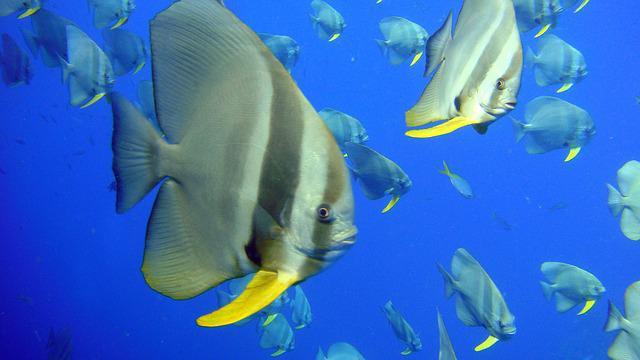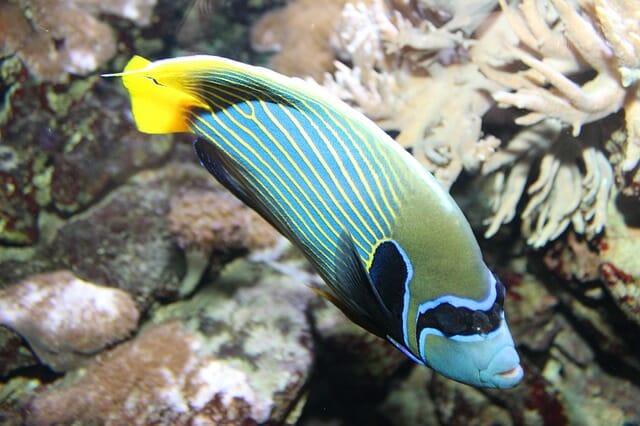When to Separate Angelfish Fry From Parents: Factors to Consider

When raising angelfish fry, it’s essential to know when to separate them from their parents. Generally, you should separate angelfish fry from their parents around six to eight weeks of age. In addition, some experts recommend that angelfish fry be removed from their parents at an even earlier age, and this approach is less common.
Table of Contents
Is It Necessary to Separate Angelfish Fry From Parents?
There are a few instances where separating the fry from their parents is unnecessary. The first instance is if you plan on keeping the angelfish in captivity and want to spawn them. In this case, you must acclimate the fry before separating them from their parents. Secondly, some aquarists choose not to separate angelfish fry from their parents because they believe doing so can lead to aggression and rivalry among the fry.
Why Is It Helpful to Separate Angelfish Fry From Parents?
Parents May Eat Fry
One of the benefits of separating angelfish fry from their parents is that it allows them to grow and develop more rapidly. In addition, if a parent angelfish overeats or eats one of its young, you will not harm the fry since they are not attached to the parent. Finally, aquarists can prevent territorial disputes among group members by separating fry from their parents at an early age.
Eggs Don’t Need Parents to Grow
Another option is to take care of the eggs yourself. If you plan on doing this, be sure to provide a safe and secure environment for the fry while incubating. Make sure there is plenty of room for them to swim around and keep the water at a comfortable temperature. In addition, provide a small piece of solid carbon or foam to hold the eggs from falling out. One last consideration is that removing the eggs can be challenging. You will need to use a glove to handle them, and it is recommended that you put them in a container with some water, so they do not dry out.
How Many Eggs Can an Angelfish Lay at Once?
A female angelfish can lay between 100 and 1,000 eggs in one breeding cycle. In addition, each egg takes 2 to 21 days to hatch, depending on environmental conditions. Its hatching time is influenced by the water temperature in which the eggs are incubated. If it stays too warm and becomes overly crowded for the developing fry, some unwanted eggs may skip their development entirely and not even hatch into juveniles.
How to Determine If Angelfish Eggs Are Viable?
If you decide to take care of the eggs yourself, it’s crucial to determine which are viable. To do this, you will need to remove a few eggs and put them in a container with water. If they start developing after being submerged underwater for more than 24 hours, they are considered viable and can be placed back into the angelfish tank.
How to Know if Eggs Are Fertilized?
If the eggs have undergone fertilization, they will become more enormous and more spherical. You may also notice that a thin membrane has formed around the egg. Additionally, if you place an infertile parent next to an ovulated one, you may be able to detect a faint scent attributed to male pheromones.
What Color Should Angelfish Eggs Be?
The color of fertilized angelfish eggs will vary from translucent amber to brown. In addition, the eggs in your community tank should all look the same.

How Do Angelfish Parents Behave Around Their Eggs?
Once the eggs have been fertilized, the parents will stop eating and become very attentive to their new charges. They will patrol around the container regularly and defend it against any intruders.
Which Parent Guards the Eggs?
The male usually patrols around the tank more and may display territorial behaviors, such as chasing away other fish. The female angelfish predominantly stays at home to incubate the eggs and protect them from predators.
Why Do Angelfish Eat Their Eggs?
This could signify that the eggs are not viable and need to be removed. If they continue to eat their eggs, it is likely because they are incubating them and want them to hatch as quickly as possible. In addition, ensure that the eggs are well-oxygenated, as egg layers often panic when they realize their clutch is being depleted.
How to Care for Angelfish Eggs?
Once the eggs have been fertilized, you should keep them in the dark location where they are protected from direct sunlight. Make sure to change the water regularly and add new substrate to the tank so the eggs can grow healthy. Additionally, the parents should be removed from the tank as soon as they have eaten them.
What Do You Do With Angelfish Eggs?
Since angelfish eggs are not easy to hatch, you will usually want to release them back into the wild once they have hatched. You can also take them home and keep them in a small aquarium where you can watch over them. In addition, you can hatch them out and keep them in a bowl or decorative container instead.
How Do You Hatch Angelfish Eggs Without the Parents?
One way to hatch angelfish eggs without the help of the parents is to place them in a warm water bath for about 30 minutes. Another option is to heat some water and slowly pour it over the eggs until they hatch.
Why Are My Angelfish Eggs Turning White?
If your angelfish eggs turn white, it could be a sign that they are not viable and need to be removed. If they continue to turn white, it is likely because the water in the tank is too cold. Additionally, it could be a sign that the water is too acidic, making it harder for them to hatch.